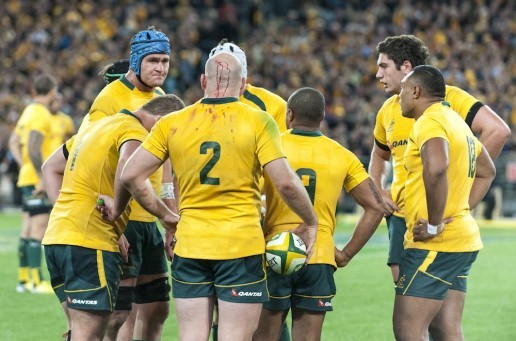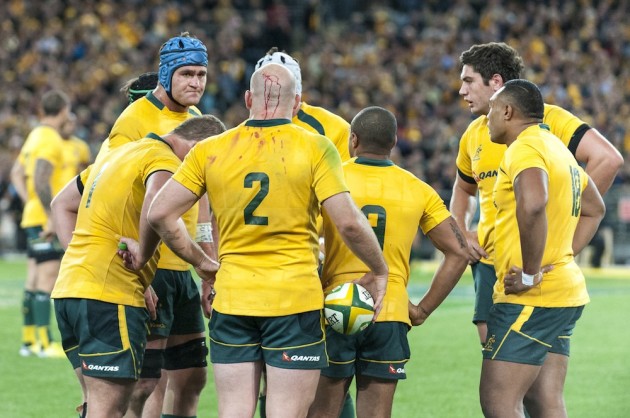If these stats don’t tell you the Wallabies need a sports psychologist, you need your head read.
To start, see if this sounds familiar.
Kick off and BLAM the Wallabies yield the softest of tries to leave them, and us, reeling. Over the next ten minutes they are just starting to regain their balance when BLAM another try is run in around the 30 minute mark. With backs to the wall the Wallabies manage to get a try or some points back just before, or even on half-time to keep them vaguely within touch.
The second half doesn’t kick off too badly – whatever was said in the sheds seems to have made an impact when BLAM BLAM – two soft tries given away between the 50 to 70 minute marks effectively end the contest. The Wallabies scramble a late try, but the match was already over.
If it does sound familiar, it’s because that’s exactly what the cumulative scoring pattern for and against the Wallabies in 2013 looks like (see below). It is even more pronounced when you look at it in terms of tries.
With such distinctive patterns of scoring fitting so well with anecdotal perception, the question has to be -‘why’?
Obviously the period that sticks out like a sore thumb is the 20 mins between 50-70 minutes. It’s in this period that the Wallabies have yielded almost half of their tries (9/19) and the matches have been taken out of reach four out of six times. You can’t help but think that fatigue has a big role to play here, especially when you consider that the Wallabies have held on to more than their fair share of ball over these Tests, forcing the opposition to defend. Thinking Clearly Under Pressure (T-CUP as Sir Clive calls it) is clearly something the Wallabies can’t do at this stage in the match.
The blood bath tends to end in the final ten-minute period – presumably because the match is already won by the opposition and/or because of the bench injection.
The next question is why is “just before the hooter” the only time the Wallabies can score? This ten-minute period (before half time and full time) is where the Wallabies have scored five of their six tries this season (keeping their one try per match average intact). Three of these tries have been within three minutes of the donger.
This indicates that mental pressure – and the inability to deal with it – is still a massive factor for the Wallabies. It’s only when “there’s nothing else for it” or the game is effectively lost that shackles can be broken.
It’s also why three critical tries have been given away through error in the first 10 minutes of three different Tests – serving to compound subsequent pressure by leaving the Wallabies to chase the game for the remaining 80. The only time the Wallabies have scored a try in the first 20 minutes of any Test this year, they came within Kurtley Beale’s moulded studs of beating the Lions.
It all adds up to a level of mental fragility that we’d hoped to have left behind in Hong Kong and on the High Veldt three years ago, but patently haven’t.
And so, while we all look for scapegoats for our current bottomless pit of Wallaby woe – it’s forwards, it’s the halves, it’s the coach, it’s the system – I’m left to wonder how much of this is actually ‘just’ in the top two inches? We know these players can perform at the highest Super Rugby level, why not internationally?
If this really is a major contributing factor to the chronic underperformance of the Wallabies, surely it’s time to get a professional in to fix it? In his quest for the World Cup in 2003, Sir Clive Woodward approached Yudha Shinar, a sports psychologist who had worked with the Israeli army. The All Blacks have had a ‘mental skills coach’ – Gilbert Enoka – since the beginning of this century. The only break he’s had from working with the team was in 2003 under John Mitchell.
What does Enoka do? I’ve put a video of the man himself at the bottom, but from a piece in the New Zealand Herald in December last year –
He began as a mental skills adviser but is now the assistant manager with a wide-ranging brief. During Adam Thomson’s judicial hearing, his counsel described Enoka as the “custodian of the culture” within the All Blacks.
‘Trying to pigeon-hole my work does not work because I am involved across many areas in this team,’ Enoka said. ‘I do not want to be an arse-licker, I want to be someone who challenges others. When you have been around for a length of time, you get a feel for what works and the sense of the direction you are heading in and that continuity creates a wonderful degree of knowledge.’
Players trust him to be able to express their fears and anxieties, knowing those issues will get help rather than being marked in a book somewhere as a sign of weakness. They are exposed when they go through those confessional box times which Enoka encourages as part of the All Blacks’ progress.
Sounds like a pretty important role to me and one that the best team in the world is pretty clear they need filled. The Wallabies have no-one.
I wonder who’s got it right?



